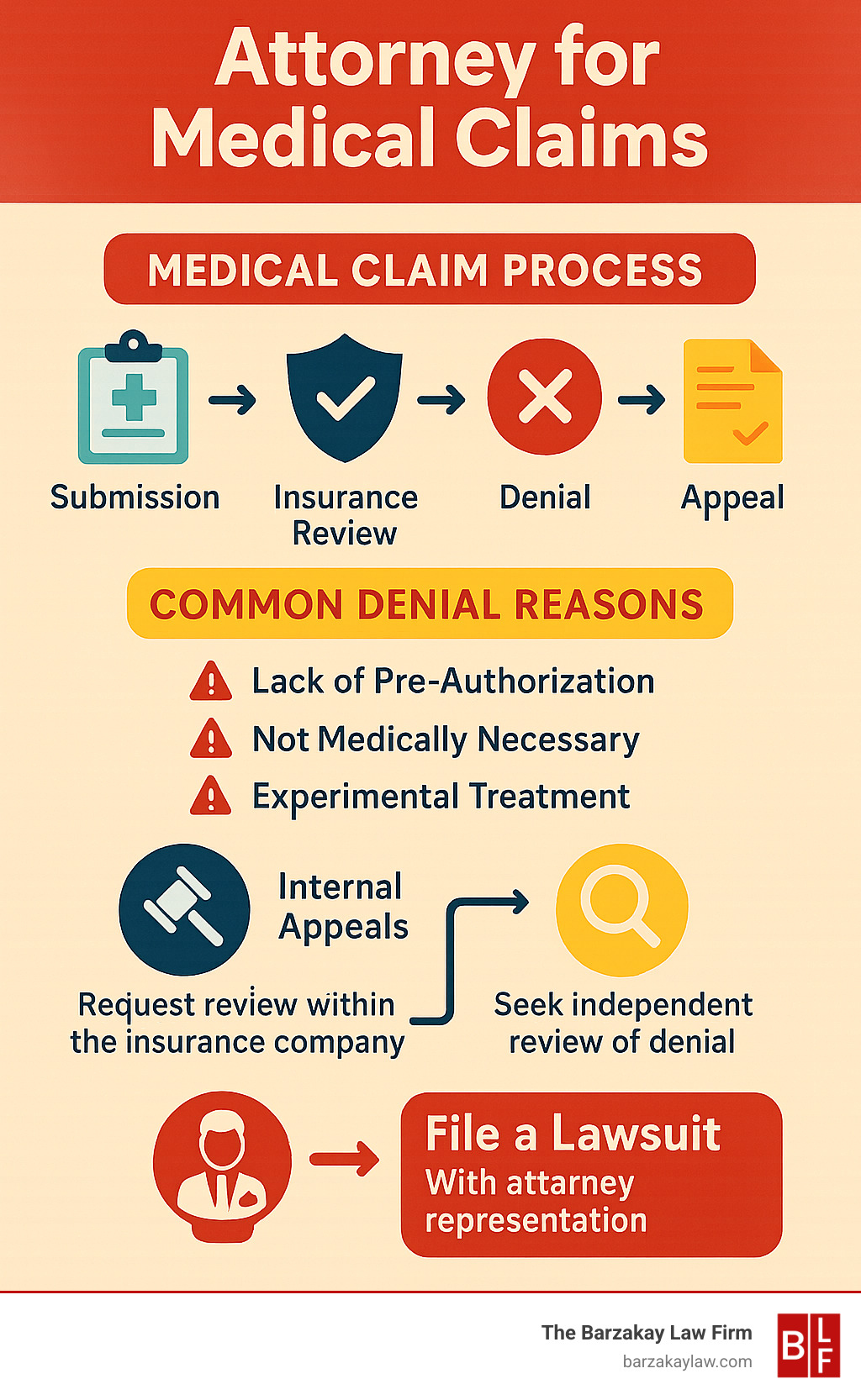Why Medical Claim Denials Create Financial Hardship for Families
An Attorney for medical claims helps families fight wrongfully denied insurance claims and recover compensation when medical negligence causes harm. Whether your health insurance rejected coverage or you’re seeking justice after medical malpractice, a lawyer can steer complex policies and legal procedures to secure the funds you deserve.
You may need an attorney for medical claims involving:
- Health insurance denials for treatments deemed “not medically necessary.”
- Critical illness claims denied over policy definitions.
- Medical malpractice injuries from hospital or doctor negligence.
- ERISA plan disputes after a failed group insurance appeal.
- Wrongful death cases due to medical errors.
Claim denials often arrive when families are most vulnerable. Insurers may use delays, confusing language, or deny valid claims, hoping you will give up. Their internal appeals process can be a dead end, as the same company that denied your claim reviews it. This tactic can also be used to run out the clock on your legal rights.
In South Florida, you don’t have to face powerful insurance companies alone. An attorney who handles medical claims can level the playing field and fight for the compensation your family needs.

Understanding Why Your Medical Claim Was Denied
Receiving a denial letter is frustrating, but it’s often just the start of the fight for fair coverage. Insurers use many reasons to deny legitimate claims, often because they are looking for any way to avoid paying.
Common reasons for denial include:
- Medical necessity disputes: The insurer disagrees with your doctor that a treatment was necessary.
- Pre-authorization requirements: You didn’t get prior approval for a service, which can happen if your doctor’s office makes a mistake or the process is too difficult.
- Claim form errors: Simple typos, wrong codes, or missing paperwork can lead to an automatic denial.
- Out-of-network providers: You received care from a provider not in your plan’s network, which is common in emergencies.
- Experimental treatment classification: The insurer labels a standard treatment as “investigational” to avoid coverage.
- Filing deadlines and pre-existing conditions: Strict deadlines or policy clauses can also cause denials.
Health Insurance and Critical Illness Denials
When your health insurance denies a claim, they must provide a written explanation, which is your roadmap for fighting back. Your rights differ depending on whether you have an individual plan or a group plan through an employer. Most group plans fall under a federal law called ERISA (The Employee Retirement Income Security Act), which has specific rules for appeals.
Denials for being “not medically necessary” or for a “lack of pre-certification” are common. These situations become even more complex if a medical misdiagnosis is involved. If you’re dealing with complications from a diagnostic error, an attorney for medical claims can help you understand your options. You can find more info about medical misdiagnosis and how a lawyer can assist.
Critical illness and long-term disability policies also face frequent denials. Insurers use narrow policy definitions to argue that a heart attack wasn’t “severe enough” or a diagnosis doesn’t meet their specific criteria for disability. Similarly, if your injuries were caused by someone else’s negligence (like in a car accident), a denial of medical coverage can impact your personal injury claim.
Families in Hollywood, Miami, and Boca Raton don’t have to steer this alone. An attorney for medical claims can help you understand your rights and fight for the coverage you deserve.
Your First Steps: How to Fight a Denied Claim

The denial letter isn’t the final word. The clock starts ticking as soon as you receive it, so your first move should be to file a written appeal. A phone call is not enough; you need a paper trail.
In your appeal letter, clearly state why you believe the denial was wrong. Then, gather your evidence. This includes all medical records, test results, and a detailed letter from your doctor explaining why the treatment was necessary. Your doctor’s support is critical.
Pay close attention to deadlines, as they are non-negotiable. Missing an appeal deadline can permanently close the door on your legal options. If your internal appeal is denied, you can still request an external review by an independent organization.
The Internal Appeals Process: A Word of Caution
The insurer’s internal appeal process is a required step for many, especially those with group plans under ERISA. However, be cautious. The same company that denied your claim is reviewing its own decision, which is why these appeals are often a dead end.
Insurers can also use this process as a delay tactic. While you wait for their review, the deadline for filing a lawsuit may be approaching. This is a common frustration for families in Hollywood, Miami, and Boca Raton, who find themselves stuck in a process designed to protect the insurance company.
When to Consider an Independent External Review
If your internal appeal fails, an independent external review is your next step before considering legal action. This process is free and provides an unbiased assessment of your claim.
An Independent Review Organization (IRO), a neutral third party, will have a healthcare professional with no ties to your insurer review your case. They will determine if the treatment was medically necessary based on accepted standards. An IRO’s decision in your favor is powerful evidence if your case later goes to court. This gives you a fair evaluation that the internal process cannot.
When and Why to Hire an Attorney for Medical Claims

There comes a point where fighting alone is no longer effective. If you’ve exhausted the appeals process or suspect medical negligence, hiring an attorney for medical claims can make a significant difference.
Consider legal help when:
- You’ve exhausted the appeals process without success.
- Your case is medically complex or involves experimental treatments.
- Your claim is governed by federal ERISA regulations.
- You suspect a bad faith denial, where the insurer is acting unfairly.
- You have serious injuries that affect your life and ability to work.
- You suspect medical malpractice caused your injury. You can learn about a medical malpractice claim attorney to understand this process better.
Insurance companies have lawyers protecting their interests; you should have one too.
The Role of an Attorney for Medical Claims
An attorney’s job is to fight for you. We can step in at any stage to:
- Prove a wrongful denial by gathering evidence and consulting medical professionals.
- Interpret complex policy terms to understand how they apply to your case.
- Handle all communication with the insurer, relieving you of that burden.
- Ensure the insurance company follows the rules and doesn’t use delay tactics.
- File a lawsuit and take your case to court if a fair settlement isn’t offered.
Legal representation improves your chances of success while you focus on your health.
How an Attorney for Medical Claims Handles Malpractice in Florida
Medical malpractice occurs when a healthcare provider’s negligence causes injury. To win a case in Florida, we must prove four things: the provider owed you a duty of care, they breached that duty, their actions caused your injury, and you suffered actual damages.
Florida has a strict two-year statute of limitations for these cases, which generally starts from when you finded the injury. Missing this deadline can mean losing your right to compensation forever, so act quickly.
We handle complex malpractice and wrongful death cases throughout South Florida, including Hollywood, Miami, and Boca Raton. These cases require thorough investigation and testimony from medical professionals. For more details, you can read the Florida medical malpractice claim guide.
The Legal Process: What to Expect After Hiring a Lawyer
When you hire The Barzakay Law Firm, we become your advocate from day one. We handle the legal work so you can focus on your recovery.
Your journey starts with an initial consultation where we listen to your story and answer your questions. From there, we begin a thorough case investigation, gathering all relevant documents, from medical records to insurance policies. For malpractice cases, we consult with medical professionals to understand what went wrong.
During the evidence gathering phase, we build the foundation of your case to prove your claim. With a strong case, we enter negotiations with insurers. Our experience often leads insurers to take claims more seriously.

Most cases in Hollywood, Miami, and Boca Raton reach a settlement without a trial. However, if the insurer refuses to be fair, we are always prepared to go to court. Throughout the process, we maintain clear client communication, so you are never left in the dark.
How Much Does a Lawyer Cost?
The cost of a lawyer shouldn’t be another burden. That’s why we work on a contingency fee basis. In simple terms: you don’t pay unless we win.
We cover all upfront costs and fees. Our payment is a percentage of the compensation we recover for you. This “no win, no fee” promise ensures everyone has access to legal representation. It also means our success is tied directly to yours.
Determining the Value of Your Claim
Calculating a claim’s worth is not based on a simple formula. We consider several factors to determine what your case is worth, aiming to restore you to the position you were in before the incident.
We calculate the value based on:
- Medical expenses: Both past and future costs for treatment, therapy, and medication.
- Lost wages and earning capacity: Income you’ve already lost and future earnings that may be affected.
- Pain and suffering: Compensation for physical discomfort and emotional distress.
- Loss of life’s enjoyment: For the activities and pleasures your injury has taken from you.
Because every case is unique, only an experienced legal team can properly value your claim. We know how to fight for every dollar you deserve.
Frequently Asked Questions about Medical Claims
Dealing with denied claims brings up many questions. Here are answers to some of the most common ones we hear from families in South Florida.
How long do I have to file a lawsuit for a denied claim in Florida?
The time limit, or statute of limitations, depends on your claim type. Missing the deadline can mean losing your right to compensation.
For medical malpractice cases, you generally have two years from the date you finded the injury to file a lawsuit. Florida law also sets a firm deadline of four years from when the malpractice occurred, regardless of findy. This can be extended to seven years in cases involving fraud or concealment by the provider.
For health insurance claim denials, the deadlines depend on your policy. Group plans under ERISA have a structured appeals process with its own timelines that you must follow before you can sue. Individual plans may allow you to file a lawsuit sooner.
Because these deadlines are strict, it’s wise to contact an attorney for medical claims quickly to protect your rights.
Can I sue my health insurance company for denying a claim?
Yes, you can sue your health insurance company, but the process varies based on your plan.
If you have an individual health plan (one you bought yourself), you can typically file a lawsuit after receiving a written denial. If you have a group health plan through an employer, it is likely governed by ERISA. This federal law usually requires you to complete the insurer’s internal appeals process before you can take them to court.
However, if an insurer fails to follow ERISA’s rules or timelines during the appeal, you may be able to file a lawsuit immediately. An attorney can ensure the insurance company plays by the rules.
What kind of damages can be recovered in a medical malpractice case?
In a medical malpractice case, you can recover damages to compensate for your losses. These are grouped into several categories:
Economic damages: These are your calculable financial losses. This includes all past and future medical bills, as well as lost income and diminished future earning capacity.
Non-economic damages: This compensates you for non-financial losses. It includes pain and suffering for your physical and emotional distress, and loss of life’s enjoyment for the impact on your hobbies and daily activities.
Punitive damages: In rare cases of extreme or intentional misconduct, these damages may be awarded to punish the wrongdoer and deter similar behavior in the future.
An attorney can help assess the full scope of your damages to determine the value of your claim.
Take the Next Step Towards Fair Compensation
Facing a denied medical claim or the effects of medical malpractice can feel like an uphill battle. The stress of medical bills and an uncertain future can be overwhelming when you should be focused on healing.
You don’t have to face these challenges alone.
Our team understands the frustration of insurance denials and the harm caused by medical negligence. We’ve seen how these situations impact families, but we’ve also seen the relief that comes with having a dedicated advocate on your side.
Protecting your legal rights is our priority. We handle the legal complexities—the paperwork, negotiations, and deadlines—so you can focus on your health and recovery.
At The Barzakay Law Firm, we help people steer these difficult situations. Whether you’re in Hollywood, Miami, Boca Raton, or nearby communities like Sunrise, Orlando, and Fort Lauderdale, we are here to help.
Our contingency fee representation means you pay nothing unless we win your case. A conversation with us could be the first step toward the compensation and peace of mind you deserve.
Get help from a Florida medical malpractice lawyer and let us put our experience to work for your family.
